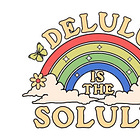Before jumping in, catch up on part one and part two if you haven’t already:
I wasn’t going to launch into a third delulu analysis—how many abbreves can one reader take?!—until my friend Sarah sent me the following headline as I sat in a Tribeca coffee shop yesterday:
“Jennifer Lopez Tampa concert, and others, cancelled”
Having no connection whatsoever to J-Lo, she at least recognized that I might want to have this essential information as part of my J-Lo Discourse™ Critical Studies.
She was right. I replied instantly:
Whoa! I wonder why?? Maybe she got sick? Or is having Ben troubles? I can’t imagine any other reason! Hopefully one of my *many* gossip substacks will be able to explain 😆
J-Lo’s team remained tight-lipped on why the dates were cancelled, so naturally I had to go digging. I didn’t have to look far.
According to Hollywood industry mag Variety, the cancellation notice for the This is Me... Now Tour reads simply:
Unfortunately, the Event Organizer has had to cancel your event. No action is required to obtain a refund.
Variety cites a less dramatic reason than mine, and the simplest: flagging ticket sales in Cleveland, Nashville, Raleigh, Atlanta, Tampa, New Orleans, and Houston.
While noting a “disappointing debut” on the Billboard 200 at position 38 for her latest album (her first in ten years), and despite being sandwiched between two self-funded movies that helped launch it, reporter Jem Aswad writes:
“While the tour is still scheduled for a robust 30 shows, large numbers of tickets at most of the tour’s dates remain unsold, judging by the seating charts on Ticketmaster. While such charts are not always completely accurate, the blue (available) segments of the seating charts on most dates are overwhelmingly larger than the grey (unavailable) ones.”
Musicians’ tour schedules seem utterly punishing—the antithesis of spaciousness I espouse in Free Time—so I don’t blame her for cancelling the more thinly sold cities.
I try not to revel in too much schadenfreude, but I’m not immune to it either.1 Sarah and I traded notes of surprise:
There’s a reason Us Weekly magazine runs a feature called, “Stars — They’re Just Like Us!” Although these are often staged or submitted by the celeb’s PR team, it’s oddly satisfying to see even the rich and famous pumping gas, rolling luggage, shopping for groceries, and taking out the trash.
Stars — They take naps! They wait for flights! They launch things that don’t go as planned!
It’s oddly comforting to know that even J-FREAKIN-LO doesn’t instantly sell out a concert tour. It creates space for our own confounding launches, where wild success fantasies meet the market in cold, hard reality.
Let’s be clear: even one arena tour in a career—one single arena show—is a lifetime achievement for ninety-nine percent of the population who have such lofty ambitions. I doubt J-Lo will lose much sleep over a few cancelled cities; she’ll merely gain more of it between bigger stops.
There are many possible reasons for slow tour sales that have nothing to do with her:
Americans are still reeling financially from the last few years
People are going to fewer concerts and movies in general.2
It’s also possible that as the Gen X and Y cohorts of her fanbase age alongside her, concerts no longer hold as much appeal. (Staying out past 8 p.m. is a wild night as far as I’m concerned).
Yet none of these were a problem for Taylor Swift, so they can’t be the only explanation. It could be that fans just aren’t that into her this album.
Given my history with 10,000 hours of neurosis, I mentioned to Sarah that if I were in J-Lo shoes and got this news, I might spiral into despair about no longer being relevant among younger and/or concert-going generations. I would probably make it mean something about my past or my future, worrying that all my biggest fears were coming true and I was now past my expiration date. That all my future efforts would be a downhill slide into obscurity, and that my biggest successes were behind me.
This could all transpire, of course. I feel it when I talk about how robust my speaking career used to be. I have become the high school quarterback that can’t stop looking in the rearview mirror, waxing nostalgic about the glory days… at least for now, until my gig inflow bounces back… if it ever will.
But neither these fears nor the market’s response would stop a true artist from forging ahead and creating and releasing work anyway. Most career artists know that not everything they do will be a mainstream smash, and that they can only make what’s in their heart/spirit/soul, otherwise they will lose their vital inner flame.3
Creators are also experiencing rising successflation (my neologism for success+inflation) on how we define success in the first place. It’s no longer sexy to run six- or even seven-figure businesses. Today’s aspirational talk is about the one-person billion-dollar business.4
In J-Lo’s case, the show will go on. Have no fear: even if there isn’t a tour stop in a city near you, there is still . . . merch! Sold on Amazon?! With J-Lo’s face on it: This is You… Wearing Me Now.
I might just need to purchase this sweatshirt as a reminder of my own delulu dreams, and that even the brightest stars don’t always get their way, as evidenced by the 25 greatest Oscars snubs of all time (including J-Lo). It’s the nature of the universe.5
It makes me feel better about the woulda-coulda-shouldas of my own launch: if only I put in the legwork to build a bigger platform, if only I wasn’t a grump about social media, if only I was better at networking, etc.
Stars — they’re just like us! Even they can’t guarantee results with all the fame, resources, connections, press, and perfect proportions in the world.
If delulu is the solulu for putting yourself on the line creatively, then remember: if the launch doesn’t go as planned, it’s not just youyou.
❤️
The footnotes of this post provide a breakdown of (at least) five reasons we experience schadenfreude, according to author Tiffany Watt Smith:
🧟♀️ Am I Running a Zombie Business? Part One
📧 B2B Mastermind — would you be interested? March 13, 2023 “We are considering putting together a mastermind of business owners who sell IP into organizations. We’re putting out feelers for now. If we were to proceed, would you be interested in joining us?”
See also: Derek Thompson’s conversation with Lucas Shaw on How Hollywood’s Hit Formula Flopped:
Although the book is a bit acerbic, I like Stephen Marche’s take in On Writing and Failure:
A paradox defines writing: The public sees writers mainly in their victories but their lives are spent mostly in defeat. I suppose that’s why, in the rare moments of triumph, writers always look a little out of place—posing in magazine profiles in their half-considered outfits with their last-minute hair; desperately re-upping their most positive reviews on Instagram; or, at the ceremonies for writing prizes—the Oscars for lumpy people—grinning like recently released prisoners readjusting to society.
The dominant narrative at the moment is that failure leads to success. The internet loves this arc: low then high; first perseverance, then making it; all struggle redeemed; the more struggle the more redemption. I hate those stories. Don’t tell me about how it’s all going to work out. Don’t show me J.K. Rowling scribbling her first Harry Potter book in cafes, a jobless single parent dependent on welfare. Stories like this are about as useful as lottery ads are to retirement planning. Personally, I’ve always felt comforted by the realization that failure is the body of a writer’s life, and success only ever a temporary attire.
In addition to the Billion Dollar Creator podcast, another recent example is an hour into this All-In conversation. From the transcript, Jason Calacanis:
“I was talking to a friend of mine, Josh Moore, who was the GM of Uber in New York and he launched his own note taking app [Wave.ai]. He’s writing it himself and he’s obsessed with this concept of building a billion dollar a Unicorn company with one employee. And this is something that a lot of people have been talking about.”
For a palette cleanser, follow these with
’s excellent number-go-up piece, and a reader favorite from Doh:Why Revenue Goals Don't Work (For Me)
Abundance was my word of 2019. I’d love to tell you I meant abundance in the broadest possible sense, appreciating the bounty already in my life, financial and otherwise. Maybe I’d sound more enlightened if the intention was to appreciate, on a daily basis, that I had a healthy body! Lungs! A beating heart! Friends and family, a roof over my head, plenty of food to eat, and a new marriage to celebrate after decades of dating disappointments.
Such snubs are also the nature of biased decision-makers, broken systems, fickle crowds, and/or elitist culturati. For a salve to all this, don’t miss the New York Times’ T Magazine’s Letters to an Artist series from 2022:
The creative life is one defined by insecurity, doubt and uncertainty (as well as overconfidence, arrogance and delusion). We asked 40 poets, painters, photographers, filmmakers, actors, musicians and writers to share hard-earned wisdom for every stage of an artistic career.
And of course,
’s viral 2009 TED Talk that later inspired Big Magic:Ultimately, trying to please others as a primary aim for the arts is a truly Sisyphean task . . .
















I LOVE this! Thank you for it. It’s filled with that JB sparkle and gold dust. And oh that last line made me smile ❤️.
Really loved the third delulu! I just read Alexis Grant’s LinkedIn article about why it’s so hard to fund a lifestyle as a creator and it reminds me that even J Lo’s having to cancel things.